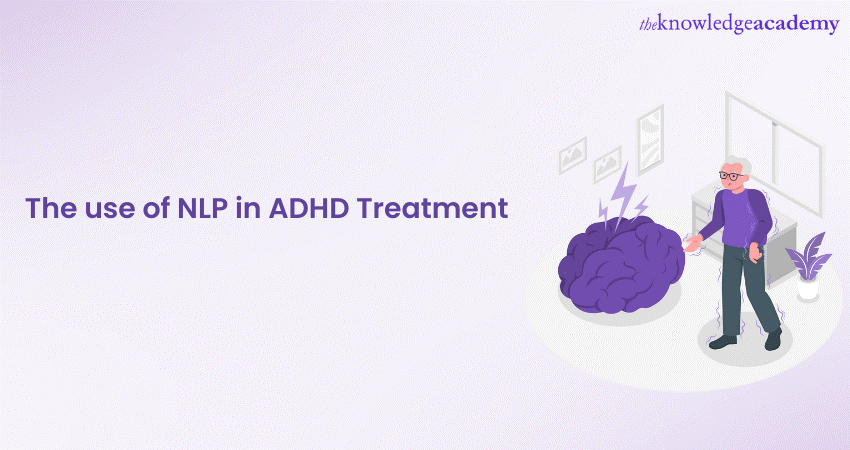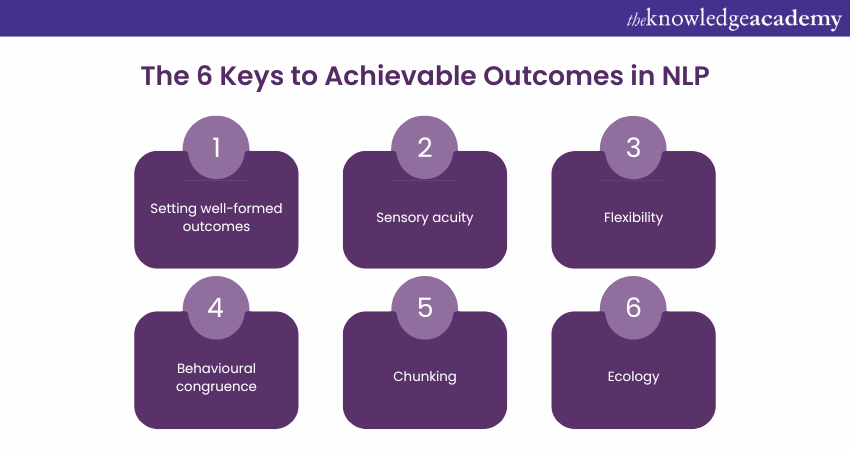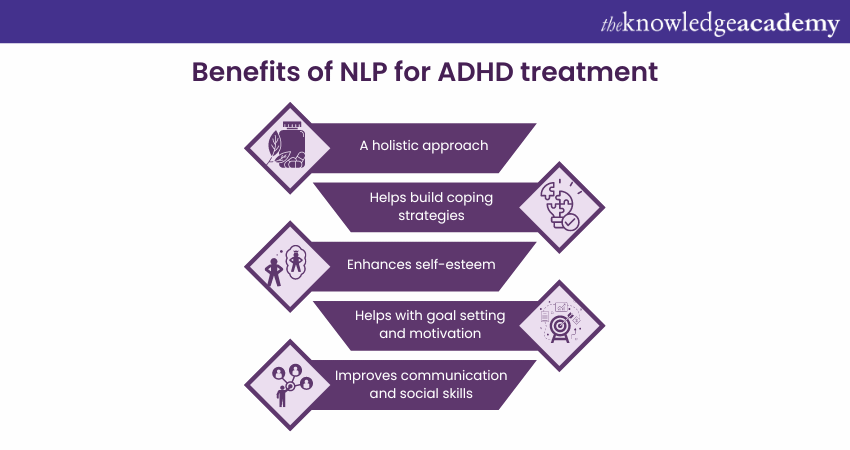We may not have the course you’re looking for. If you enquire or give us a call on +48 221041849 and speak to our training experts, we may still be able to help with your training requirements.
Training Outcomes Within Your Budget!
We ensure quality, budget-alignment, and timely delivery by our expert instructors.

Attention-Deficit Hyperactivity Disorder (ADHD) can be defined as a complex neurodevelopmental condition that can significantly impact an individual's daily life. While there is no one-size-fits-all approach to managing ADHD, incorporating Neuro-Linguistic Programming (NLP) into the treatment plan can offer valuable benefits and complement traditional interventions. In this blog, we will tell you all you need to know about the use of NLP in ADHD treatment, including various NLP techniques and the benefits they provide.
Table of Contents
1) What are the NLP Techniques used for ADHD treatment?
a) Anchoring
b) Reframing
c) Visualisations
2 Benefits of NLP for ADHD treatment
3) Conclusion
What are the NLP Techniques used for ADHD treatment?
This blog section will examine some of the NLP Techniques used to treat ADHD.

Anchoring
Anchoring is a powerful NLP technique that involves creating a connection between an emotional state and a specific trigger or stimulus. For individuals with ADHD, who often experience fluctuations in their focus and emotional well-being, anchoring can be a game-changer.
During an NLP session, the practitioner helps the individual identify a positive emotional state they wish to access consistently. It could be a feeling of calmness, confidence, or motivation. Once the desired emotion is recognised, the practitioner grounded in the 4 Pillars of NLP in anchor this emotion to a physical gesture or action, such as touching two fingers together.
When the individual experiences moments of distraction or restlessness, they can trigger the anchored emotion by using the associated gesture. With practice, this technique helps the person regain focus and control over their emotional responses, enabling them to navigate through challenging situations more effectively. This is crucial for individuals seeking to Improve Communication Skills and maintain a calm demeanor in social interactions.
Reframing
ADHD can often be accompanied by negative self-perceptions and frustration due to difficulties in various aspects of life. Reframing is an NLP ADHD technique that aims to change the way an individual perceives a situation or challenge. This technique can be beneficial in understanding the Advantages of Assertiveness, as it helps individuals reinterpret their impulsivity as a strength rather than a weakness.
In an NLP session, the practitioner works with the individual to identify recurring negative thought patterns or limiting beliefs related to ADHD. These beliefs might include feeling inadequate, believing they are unable to succeed, or being overwhelmed by their condition. By exploring different NLP learning styles and techniques, the practitioner can help the individual shift these limiting beliefs into more positive and empowering ones.
Through a guided process, the practitioner encourages the individual to explore alternative perspectives and reinterpret these situations in a more positive light. For example, instead of viewing their impulsivity as a weakness, they can learn to see it as a sign of creativity and spontaneity. By reframing their experiences, individuals with ADHD can develop a more optimistic outlook, which can have a considerable impact on their emotional well-being and daily functioning.
Visualisations
Visualisations are a fundamental aspect of NLP and can be supportive for individuals with ADHD, as they often struggle with maintaining focus and attention. This technique harnesses the power of mental imagery to improve concentration and cognitive functioning.
During an NLP session, the individual is guided through a series of visualisations, where they imagine themselves accomplishing tasks successfully, staying focused, and managing their ADHD symptoms with ease. By consistently practising these visualisations, individuals can train their minds to stay on track and reinforce positive behaviours.
Moreover, visualisations can be utilised to reduce anxiety and stress. Individuals with ADHD may experience heightened levels of anxiety due to their difficulties in staying organised and managing time. Through guided imagery, ADHD NLP practitioners can help them visualise overcoming challenges and maintaining a sense of calm and control in their daily lives.
Take control of your mind and transform your life with NLP by joining our Neuro-Linguistic Programming Courses today!
Benefits of NLP for ADHD treatment
Let's explore the benefits NLP provides when used in conjunction with ADHD treatment.

A holistic approach
NLP adopts a holistic view of human experience and behaviour. When used alongside traditional ADHD treatments such as medication and therapy, it addresses not only the symptoms but also the underlying thought patterns and emotional responses. NLP's emphasis on understanding the individual's subjective experience allows practitioners to tailor techniques that resonate with the unique needs of each person with ADHD.
By focusing on the whole person and their interactions with the environment, NLP can provide insights into how ADHD impacts different aspects of their life. This holistic understanding helps in developing strategies that can enhance coping skills, boost self-esteem, and improve overall functioning.
Helps build coping strategies
Individuals with ADHD often struggle with impulsivity, distractibility, and difficulty in organising tasks. NLP equips them with practical coping strategies to navigate these challenges effectively.
Through NLP sessions, individuals learn techniques to manage their impulses, develop better time management skills, and break down tasks into manageable steps. For instance, the "chunking" technique encourages breaking down complex tasks into smaller, more achievable portions, making them less overwhelming.
Moreover, NLP interventions can help individuals identify and understand their triggers for impulsive behaviour or emotional responses. With this awareness, they can learn to pause, assess the situation, and make more conscious decisions, leading to improved self-regulation.
Enhances self-esteem
ADHD can sometimes lead to feelings of frustration, underachievement, and a sense of being "different" from others. NLP addresses these emotional aspects by working on self-esteem and self-confidence.
NLP practitioners engage individuals in positive affirmations and guided self-reflection exercises. These activitie, such as NLP Brainstorming, help in rewiring negative thought patterns and replacing them with empowering beliefs. As individuals develop a more positive self-concept, they are better equipped to face challenges with resilience and optimism.
Helps with goal setting and motivation
One of the core principles of NLP is outcome-oriented thinking. Setting clear and achievable goals is necessary for individuals with ADHD to stay focused and motivated.
NLP practitioners work with individuals to define realistic and meaningful goals. By breaking down these objectives into manageable steps and creating a clear roadmap, individuals can stay on track and experience a sense of accomplishment as they progress towards their aspirations.
Improves communication and social skills
Social interactions can be difficult for individuals with ADHD, as they may struggle with impulse control and listening skills. NLP Training can enhance communication and social skills by focusing on rapport-building and active listening techniques.
Practitioners teach individuals how to establish strong connections with others through mirroring body language, active listening, and Effective Communication. These skills can lead to improved relationships, reduced misunderstandings, and increased support from peers, family, and friends.
Conclusion
All in all, Neuro-Linguistic Programming (NLP) offers a unique and valuable approach to complementing traditional ADHD treatments. Through its techniques, individuals with ADHD can develop coping strategies, enhance their focus, and improve overall well-being. By incorporating NLP in the ADHD treatment plan, we can work towards empowering those with ADHD to lead fulfilling lives.
Unlock your potential and master the art of NLP by joining our comprehensive NLP Training Courses now!
Frequently Asked Questions
Upcoming Business Skills Resources Batches & Dates
Date
 Neuro Linguistic Programming
Neuro Linguistic Programming
Fri 17th Jan 2025
Fri 21st Mar 2025
Fri 16th May 2025
Fri 18th Jul 2025
Fri 19th Sep 2025
Fri 21st Nov 2025







 Top Rated Course
Top Rated Course



 If you wish to make any changes to your course, please
If you wish to make any changes to your course, please


